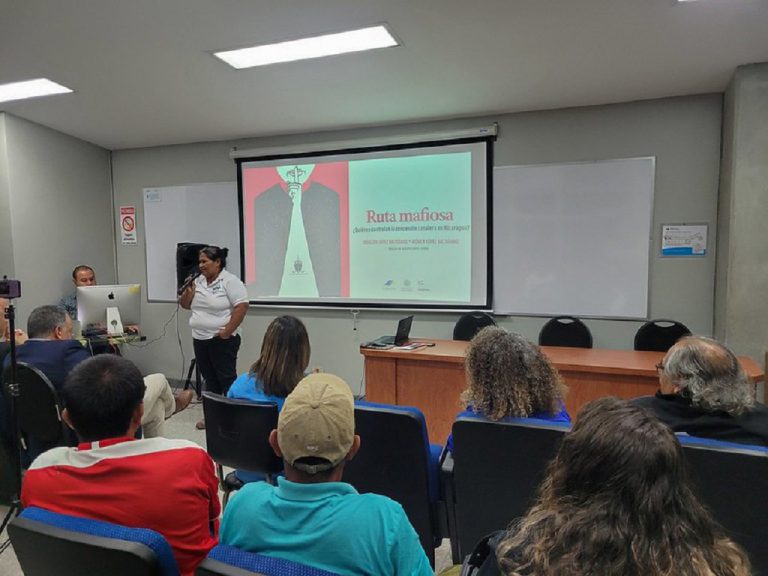28 de marzo 2023

Children of Exile: The Births “Sowing Hope” in the Camp of Nicaraguan Farmers

PUBLICIDAD 1M
PUBLICIDAD 4D
PUBLICIDAD 5D
Exiled Nicaraguan rural leader Francisca Ramirez, during the presentation of the book “Mafia Route” in San Jose, Costa Rica.

Exiled Nicaraguan rural leader Francisca Ramirez, during the presentation of the book “Mafia Route” in San Jose, Costa Rica. Photo: Katherine Estrada | Confidencial
Exiled Nicaraguan farmers’ rights activist Francisca Ramirez has led the movement against Nicaragua’s failed inter-oceanic canal project since 2013. Now living in exile in Costa Rica, the rural leader declared to Confidencial: “It’s totally clear that corruption and other economic interests,” are the forces behind those who control the canal concession. For that reason, she and her group continue demanding the repeal of that “false project”.
The Canal concession was granted in 2013 to a Chinese magnate who subsequently lost most of his fortune and never actually initiated construction. Nonetheless, the law is still on the books in Nicaragua, granting rights to all the land along the route of the never-built project.
“We won’t allow them to illegally confiscate our lands,” Ramirez stated, after participating in the presentation of a new book, “Mafia Route.” The book, authored by siblings Umanzor and Monica Lopez Baltodano, reveals the legal-financial tangle and the network set up by the Ortega-Murillo regime to facilitate the supposed canal megaproject, and all their related business dealings.
The book presentation was also attended by rural leaders Elias Ruiz and Abel Marenco, both originally from the Nicaraguan department of Nueva Guinea. These leaders, along with “doña Chica” have defended Nicaragua’s national sovereignty, threatened by the ominous canal concession made by Ortega. They demand “a firm hand against the dictator.”
Abel Marenco says he suspected from the beginning the presence of a “mafia route” behind the canal project. “I said as much to Telemaco Talavera, then in charge for promoting the project, at the La Fonseca (community in Nueva Guinea) parish church on December 27, 2014. [I told him] those companies were shell companies,” in reference to the still existing 23 phantom companies registered in different tax havens such as Hong Kong, Beijing, Shanghai, the Netherlands, the Caiman Islands, and Nicaragua, all documented in the investigation of the Lopez Baltodano family.
Ramirez commented that the investigation reaffirms that they [the rural anti-canal movement] haven’t been mistaken, and that, indeed, there are economic interests that want to steal their lands. “In 2013, Ortega awarded a concession [for the megaproject and all the related land] and sold the country’s sovereignty. (…) This book confirms the reality.”
The study’s authors pointed out that the existence of the Rural Anti-Canal Movement and the massive protests they led were decisive factors in keeping the concession from advancing in the way the Ortega-Murillo regime had envisioned.
Since 2013, the Anti-Canal Rural Movement has been demanding the repeal of Law 840 that legally established the canal project and permits the expropriation of their lands. Over the years, they’ve held over a hundred citizens’ marches. Francisca Ramirez recalls that they’ve suffered violence and persecution all this time on the part of the Ortega-Murillo regime.
Marenco added that the level of violence the dictatorship employed against their movement kept increasing. “Many of our people have had their land stolen, they’ve been beaten during the demonstrations, they were imprisoned, they were driven into exile, banished, and some have had their nationality taken away. Francisca Ramirez is one of them.”
Around 30 unjustly imprisoned people from the rural movement were among the regime’s over 200 political prisoners. While some of the political prisoners were released and banished in February, “we still have Bismarck Sandigo [in jail]; he’s a rural leader and one of the 36 political prisoners still remaining in El Chipote,” Ramirez remarked.
Despite all this, Ramirez and Marenco remain organized. “We continue demanding the repeal of the law. We’re not going to abandon the struggle for anything, and we’ve demonstrated that. We’re going to recover our lands and the sovereignty that Ortega sold out,” Ramirez concluded.
This article was originally published in Spanish in Confidencial and translated by Havana Times
PUBLICIDAD 3M
Periodista nicaragüense exiliada en Costa Rica. Se ha especializado en la cobertura de temas de migración, género y salud sexual y reproductiva. También ha trabajado en Marketing y Ventas y ha sido Ejecutiva de Cuentas.
PUBLICIDAD 3D